人教版高中英语必修五-unit1-Great Scientists language points 知识点 课件(23张ppt)
文档属性
| 名称 | 人教版高中英语必修五-unit1-Great Scientists language points 知识点 课件(23张ppt) | 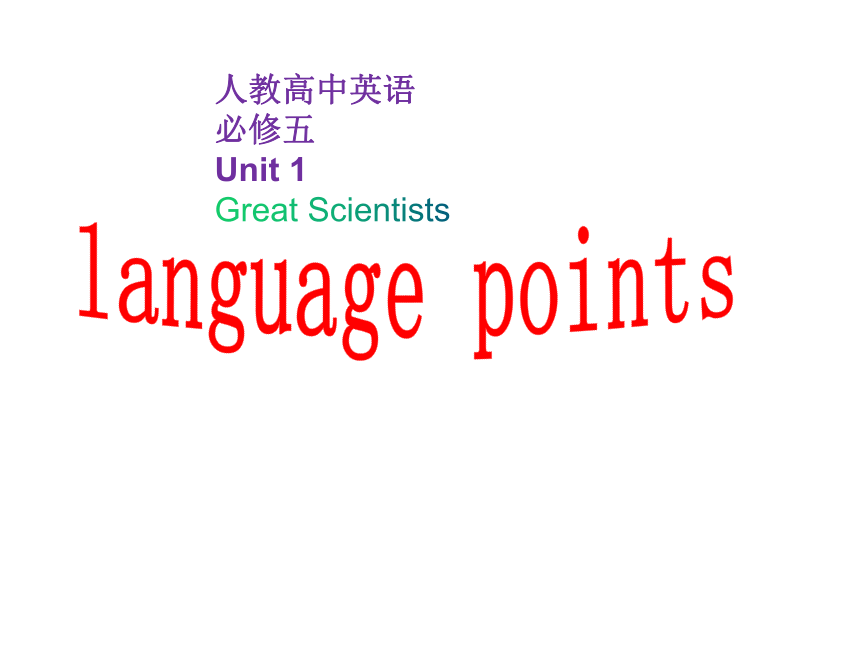 | |
| 格式 | zip | ||
| 文件大小 | 1.7MB | ||
| 资源类型 | 教案 | ||
| 版本资源 | 人教版(新课程标准) | ||
| 科目 | 英语 | ||
| 更新时间 | 2020-11-23 09:13:34 | ||
图片预览


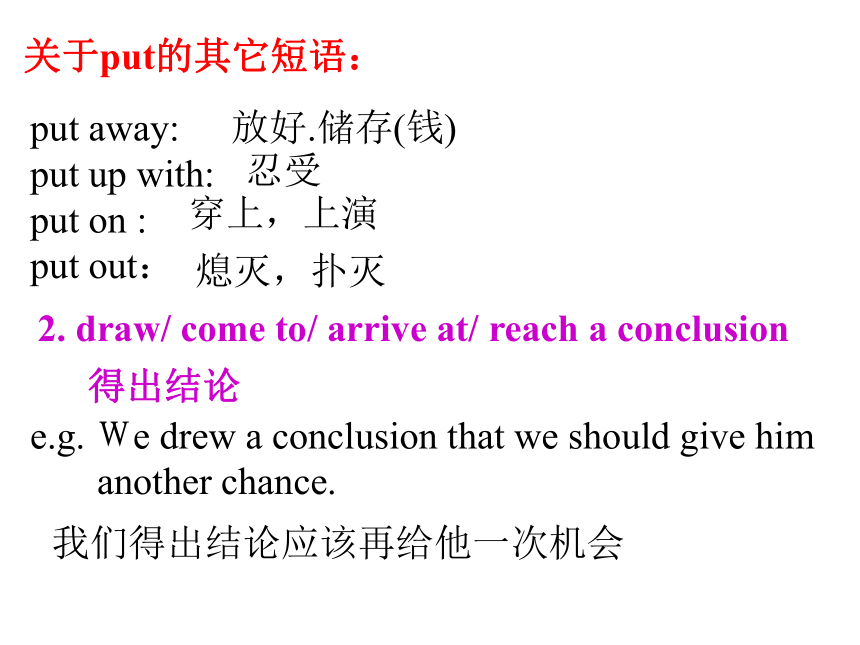
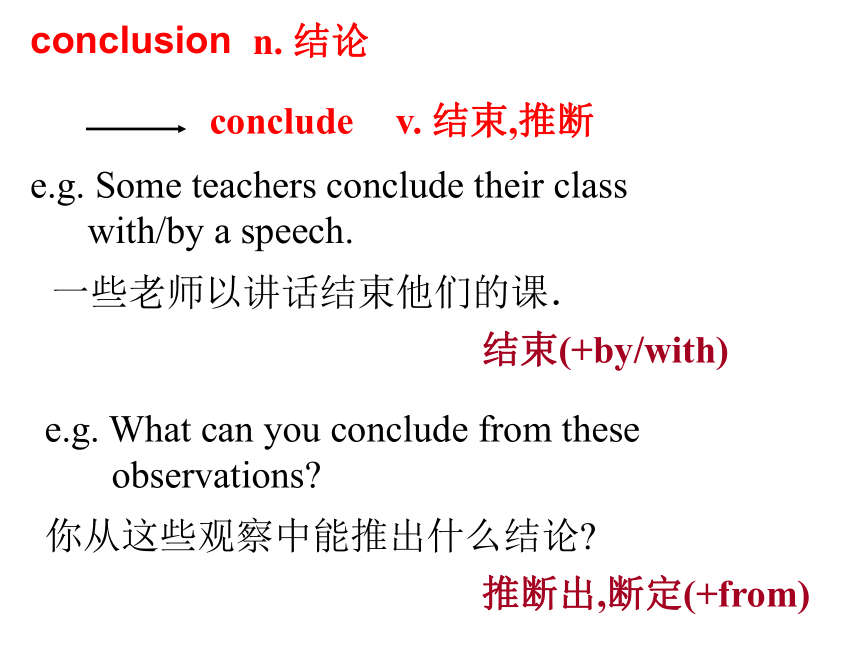
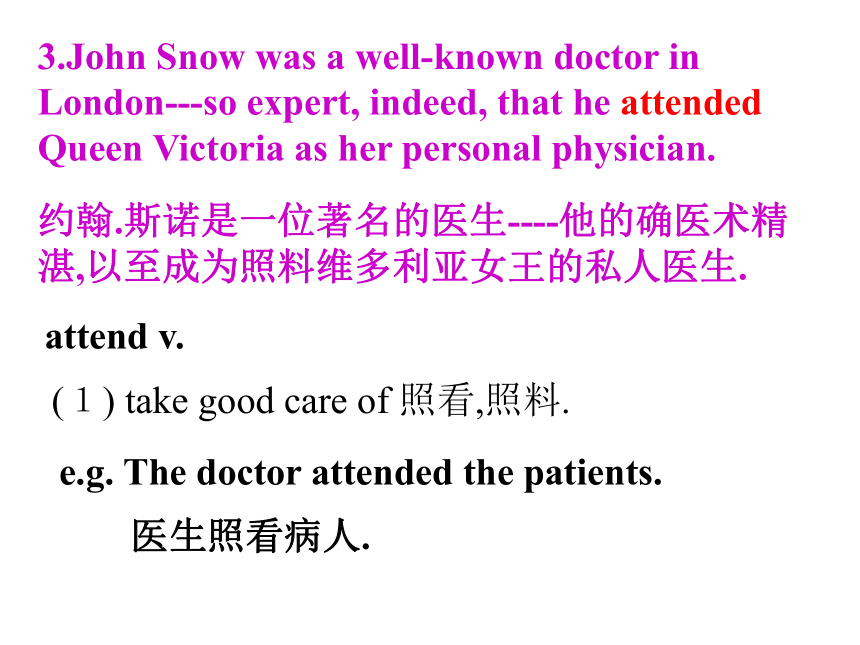
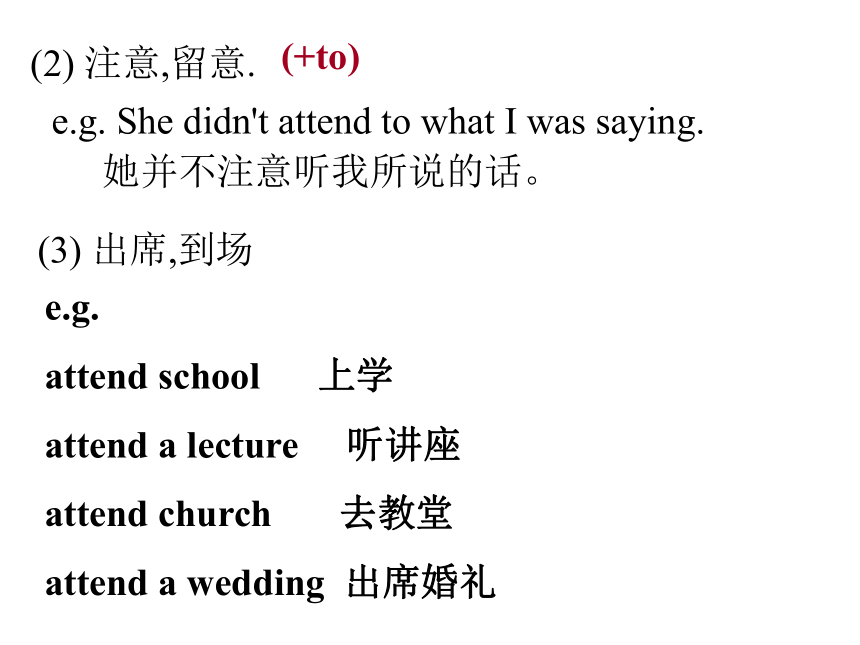
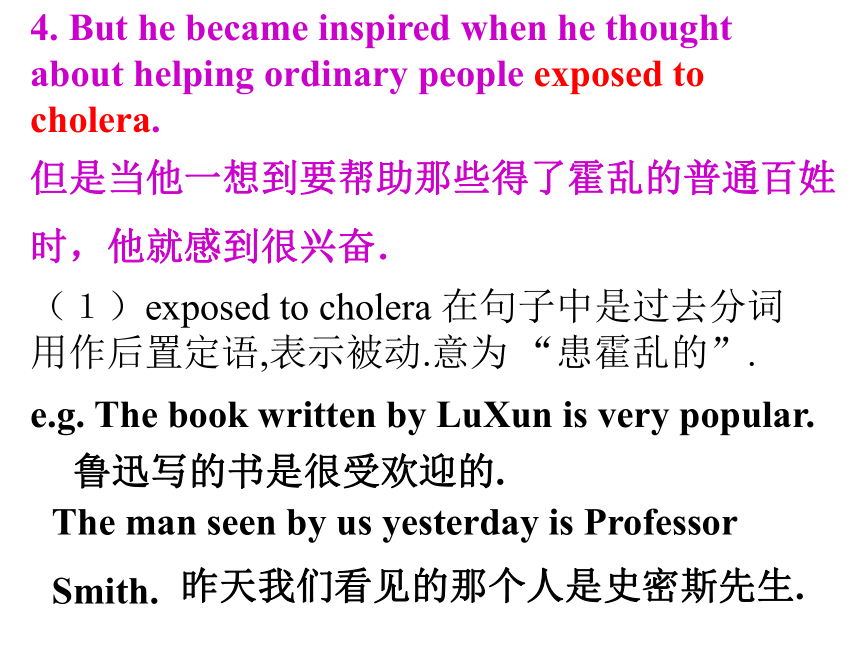
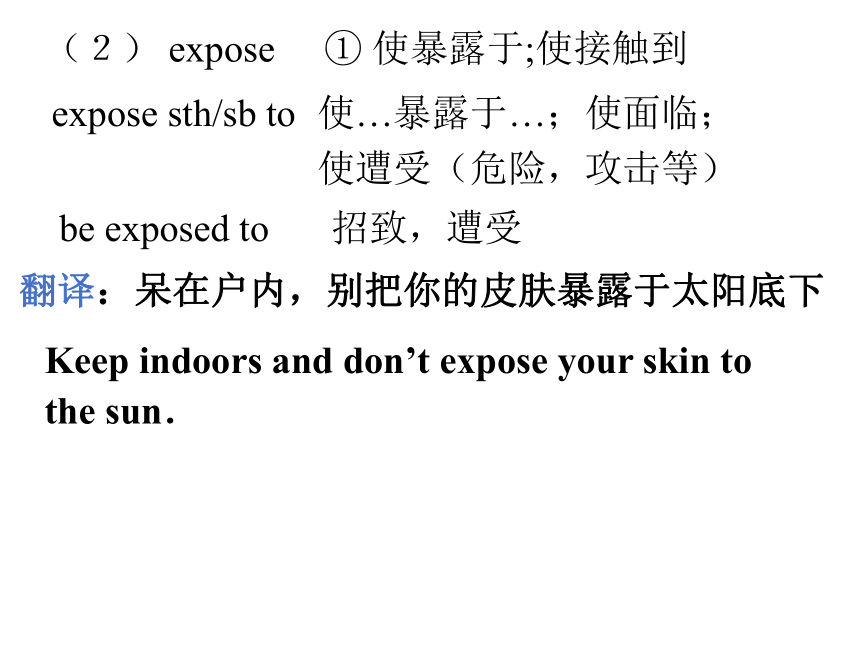
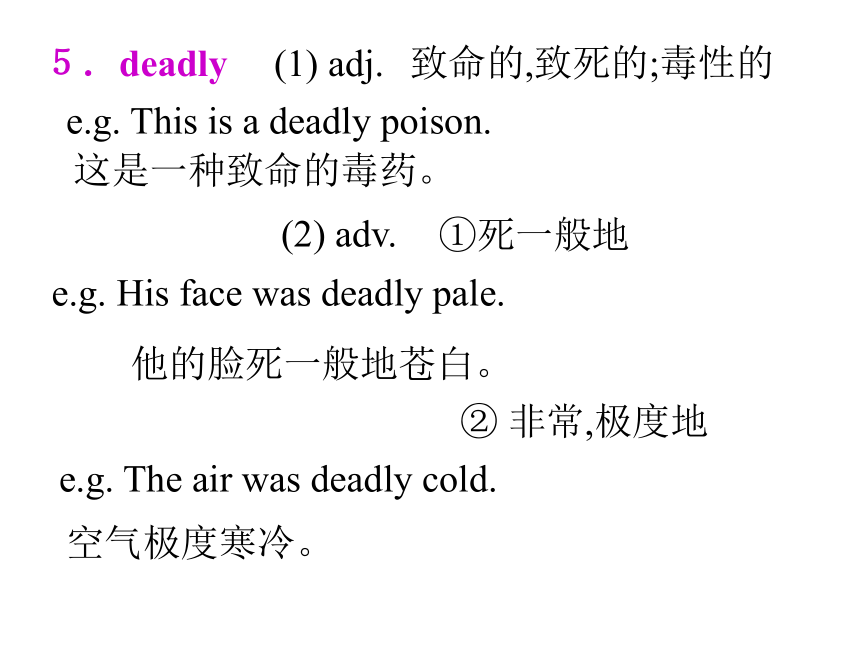
文档简介
(共23张PPT)
Who
put
forward
a
theory
about
black
holes.
谁提出了黑洞理论
put
forward
e.g.
put
forward
a
very
good
suggestion/plan
提出了一个很好的建议
/计划
(1)
提出(+表示建议,计划等的名词)=
come
up
with
e.g.
You
ought
to
put
your
watch
forward
ten
minutes.
(2)
把...向前拨
e.g.
I
put
myself
forward
as
the
monitor.
(3)
推荐
put
away:
put
up
with:
put
on
:
put
out:
关于put的其它短语:
忍受
穿上,上演
熄灭,扑灭
放好.储存(钱)
2.
draw/
come
to/
arrive
at/
reach
a
conclusion
得出结论
我们得出结论应该再给他一次机会
e.g.
We
drew
a
conclusion
that
we
should
give
him
another
chance.
conclusion
n.
结论
conclude
v.
结束,推断
e.g.
Some
teachers
conclude
their
class
with/by
a
speech.
一些老师以讲话结束他们的课.
结束(+by/with)
e.g.
What
can
you
conclude
from
these
observations?
你从这些观察中能推出什么结论?
推断出,断定(+from)
3.John
Snow
was
a
well-known
doctor
in
London---so
expert,
indeed,
that
he
attended
Queen
Victoria
as
her
personal
physician.
约翰.斯诺是一位著名的医生----他的确医术精湛,以至成为照料维多利亚女王的私人医生.
attend
v.
(1)
take
good
care
of
照看,照料.
e.g.
The
doctor
attended
the
patients.
医生照看病人.
e.g.
attend
school
上学
attend
a
lecture
听讲座
attend
church
去教堂
attend
a
wedding
出席婚礼
(2)
注意,留意.
e.g.
She
didn't
attend
to
what
I
was
saying.
她并不注意听我所说的话。
(+to)
(3)
出席,到场
4.
But
he
became
inspired
when
he
thought
about
helping
ordinary
people
exposed
to
cholera.
但是当他一想到要帮助那些得了霍乱的普通百姓
时,他就感到很兴奋.
The
man
seen
by
us
yesterday
is
Professor
Smith.
(1)exposed
to
cholera
在句子中是过去分词用作后置定语,表示被动.意为
“患霍乱的”.
e.g.
The
book
written
by
LuXun
is
very
popular.
鲁迅写的书是很受欢迎的.
昨天我们看见的那个人是史密斯先生.
expose
sth/sb
to
使…暴露于…;使面临;
使遭受(危险,攻击等)
翻译:呆在户内,别把你的皮肤暴露于太阳底下
Keep
indoors
and
don’t
expose
your
skin
to
the
sun.
be
exposed
to
招致,遭受
(2)
expose
①
使暴露于;使接触到
5.deadly
致命的,致死的;毒性的
e.g.
This
is
a
deadly
poison.
这是一种致命的毒药。
(2)
adv.
①死一般地
e.g.
His
face
was
deadly
pale.
他的脸死一般地苍白。
②
非常,极度地
e.g.
The
air
was
deadly
cold.
空气极度寒冷。
(1)
adj.
6.
cure
①
vt.治愈,治疗/消除(弊病等);纠正
e.g.
The
doctor
cured
him
of
his
cold.
cure
sb.
of
sth.
治好了某人的…,纠正了某人的…
医生治好了他的感冒.
e.g.
He
cured
the
child
of
bad
habits.
他纠正了孩子的坏习惯.
②
n.治愈;痊愈
e.g.
There's
no
known
cure
for
AIDS.
治疗艾滋病尚无良方。
[(+for)]
7.
So
many
thousands
of
terrified
people
died
every
time
there
was
an
outbreak.
every
time
在这里是连词,引导时间状语从句,意为“每次,每当”
e.g.
Every
time
I
meet
him,
I
always
think
of
the
things
happened
between
us.
每次见到他,我就想起发生在我们之间的事情。
每次爆发霍乱时,就有大批惊恐的老百姓病死.
immediately,
the
moment,
directly,
instantly
等与
every
time一样,都可以用作连词引导时间状语从句,意为
“一…..就”。
e.g.
I
will
give
the
letter
to
him
immediately
I
see
him.
我一见到他就把这封信给他。
I
came
directly
I
got
your
letter.
我一接到你的信就来了。
注意:
8.The
second
suggested
that
people
absorbed
this
disease
into
their
bodies
with
their
meals
.
第二种看法是在吃饭的时候人们把这种病毒引入体内的.
①
注意此处的suggest表示“暗示,表明”,而非
表示建议,此时从句中不需要用虚拟语气.
The
dentist
suggested
____________.
(1)牙医建议她改天再来。
that
she
come
another
day
(2)她的表情表明她很开心。
Her
expression
suggested
_________.
that
she
was
happy
②
absorb…..into
吸收
e.g.
The
big
company
has
gradually
absorbed
these
small
companies
into
its
own
organization.
这家大公司逐渐将这些小的公司吞并了。
absorb
v.
(1)吸收
e.g.
It's
too
hard
for
me
to
absorb
so
many
good
ideas
at
once.
对我来说很难一下完全吸收这么多好主意。
老人全神贯注地读这本书。
e.g.
The
old
man
was
absorbed
in
the
book.
The
old
man
absorbed
himself
in
the
book.
be
absorbed
in
=
absorb
oneself
in
(2)
吸引;使专心;使全神贯注
9.
In
two
particular
streets,
the
cholera
outbreak
was
so
severe
that
more
than
500
people
died
in
10
days.
在两条街道上,霍乱流行的特别厉害,在十天之内就死去了五百多人。
全神贯注于…
severe
v.
(1)
strict
严厉的;苛刻的;严格的.
e.g.
My
father
was
severe
with
me.
我的父亲对我很严厉。
be
severe
with/on/upon
…
对…严格,严厉
(2)
very
serious
剧痛的,剧烈的,严重的
考大学的激烈竞争
e.g.
the
severe
competition
for
university
看来霍乱的流行要归罪于饮水了。
(1)
be+动词不定式,可以表示该做或不该做的
事情,相当于must,
should,
ought
to
等。
e.g.
You
are
not
to
drop
litter
in
the
park.
公园里不允许乱丢纸屑。
10.
It
seemed
that
the
water
was
to
blame.
e.g.
You
are
not
to
drop
litter
in
the
park.
公园里不允许乱丢纸屑。
(2)
blame
vt.
①
责备,指责
(sb)
be
to
blame
for
…应为…受到责备
e.g.
The
driver
was
to
blame
for
the
accident.
司机应为这次事故承担责任
e.g.
He
blamed
you
for
the
neglect
of
duty.
他责备你怠忽职守。
blame
sb.
for
sth./doing
sth. 因某事责备某人
短语:
②
把...归咎(于)
e.g.
The
teacher
blamed
the
mistake
on
my
carelessness.
老师把错误归咎于我的粗心.
blame
sth.
on
sb. 把…归咎于某人身上
12.
handle
①
[C]柄,把手
e.g.
the
handle
of
the
door/
the
cup
门/杯子的把手
②
vt.
对待,处理
e.g.
I
didn't
know
how
to
handle
these
people.
我不知道如何对付这些人。
翻译:
这条铁路把西藏(Tibet)和内地(the
inland
area)
连起来了.
13.
link
A
to
B
把A与B连接;联系
e.g.
Fingerprints
linked
the
suspect
to
the
crime.
指纹证实了嫌疑犯的犯罪事实。
被动形式:A
be
linked
to
B
This
railway
links
Tibet
to
the
inland
areas.
14.
With
this
extra
evidence
John
Snow
was
able
to
announce
with
certainty
that
polluted
water
carried
the
virus.
有了这个特别的证据,约翰.斯诺就能够肯定的宣布,这种被污染的水携带病毒。
(1)
announce
vt.
宣布,发布
e.g.
They
announced
that
she
would
give
one
extra
song.
他们宣布说她将再唱一首歌。
The
vote
was
completed.
The
chairman
announced
the
result.
投票完毕。主席宣布了结果。
(2)
with
certainty
有把握地
have
(no)
certainty
of
(没)有…的把握
e.g.
Can
you
solve
the
problem
with
certainty?
翻译:你有把握解决这个问题吗?
Do
you
have
certainty
of
solving
the
problem?
15.
instruct
vt.
①
指示,命令,吩咐
e.g.
He
instructed
me
to
deliver
it
to
a
customer.
他吩咐我把东西送去给顾客。
instruct
sb.
(not)
to
do
sth.
吩咐/指导/命令某人(不)做某事
②
教授;训练;指导
e.g.
My
job
is
to
instruct
you
in
English.
我的工作是教你们英语。
instruct
sb.
(in
sth.)
教授某人学校科目,
传授某人技巧
Who
put
forward
a
theory
about
black
holes.
谁提出了黑洞理论
put
forward
e.g.
put
forward
a
very
good
suggestion/plan
提出了一个很好的建议
/计划
(1)
提出(+表示建议,计划等的名词)=
come
up
with
e.g.
You
ought
to
put
your
watch
forward
ten
minutes.
(2)
把...向前拨
e.g.
I
put
myself
forward
as
the
monitor.
(3)
推荐
put
away:
put
up
with:
put
on
:
put
out:
关于put的其它短语:
忍受
穿上,上演
熄灭,扑灭
放好.储存(钱)
2.
draw/
come
to/
arrive
at/
reach
a
conclusion
得出结论
我们得出结论应该再给他一次机会
e.g.
We
drew
a
conclusion
that
we
should
give
him
another
chance.
conclusion
n.
结论
conclude
v.
结束,推断
e.g.
Some
teachers
conclude
their
class
with/by
a
speech.
一些老师以讲话结束他们的课.
结束(+by/with)
e.g.
What
can
you
conclude
from
these
observations?
你从这些观察中能推出什么结论?
推断出,断定(+from)
3.John
Snow
was
a
well-known
doctor
in
London---so
expert,
indeed,
that
he
attended
Queen
Victoria
as
her
personal
physician.
约翰.斯诺是一位著名的医生----他的确医术精湛,以至成为照料维多利亚女王的私人医生.
attend
v.
(1)
take
good
care
of
照看,照料.
e.g.
The
doctor
attended
the
patients.
医生照看病人.
e.g.
attend
school
上学
attend
a
lecture
听讲座
attend
church
去教堂
attend
a
wedding
出席婚礼
(2)
注意,留意.
e.g.
She
didn't
attend
to
what
I
was
saying.
她并不注意听我所说的话。
(+to)
(3)
出席,到场
4.
But
he
became
inspired
when
he
thought
about
helping
ordinary
people
exposed
to
cholera.
但是当他一想到要帮助那些得了霍乱的普通百姓
时,他就感到很兴奋.
The
man
seen
by
us
yesterday
is
Professor
Smith.
(1)exposed
to
cholera
在句子中是过去分词用作后置定语,表示被动.意为
“患霍乱的”.
e.g.
The
book
written
by
LuXun
is
very
popular.
鲁迅写的书是很受欢迎的.
昨天我们看见的那个人是史密斯先生.
expose
sth/sb
to
使…暴露于…;使面临;
使遭受(危险,攻击等)
翻译:呆在户内,别把你的皮肤暴露于太阳底下
Keep
indoors
and
don’t
expose
your
skin
to
the
sun.
be
exposed
to
招致,遭受
(2)
expose
①
使暴露于;使接触到
5.deadly
致命的,致死的;毒性的
e.g.
This
is
a
deadly
poison.
这是一种致命的毒药。
(2)
adv.
①死一般地
e.g.
His
face
was
deadly
pale.
他的脸死一般地苍白。
②
非常,极度地
e.g.
The
air
was
deadly
cold.
空气极度寒冷。
(1)
adj.
6.
cure
①
vt.治愈,治疗/消除(弊病等);纠正
e.g.
The
doctor
cured
him
of
his
cold.
cure
sb.
of
sth.
治好了某人的…,纠正了某人的…
医生治好了他的感冒.
e.g.
He
cured
the
child
of
bad
habits.
他纠正了孩子的坏习惯.
②
n.治愈;痊愈
e.g.
There's
no
known
cure
for
AIDS.
治疗艾滋病尚无良方。
[(+for)]
7.
So
many
thousands
of
terrified
people
died
every
time
there
was
an
outbreak.
every
time
在这里是连词,引导时间状语从句,意为“每次,每当”
e.g.
Every
time
I
meet
him,
I
always
think
of
the
things
happened
between
us.
每次见到他,我就想起发生在我们之间的事情。
每次爆发霍乱时,就有大批惊恐的老百姓病死.
immediately,
the
moment,
directly,
instantly
等与
every
time一样,都可以用作连词引导时间状语从句,意为
“一…..就”。
e.g.
I
will
give
the
letter
to
him
immediately
I
see
him.
我一见到他就把这封信给他。
I
came
directly
I
got
your
letter.
我一接到你的信就来了。
注意:
8.The
second
suggested
that
people
absorbed
this
disease
into
their
bodies
with
their
meals
.
第二种看法是在吃饭的时候人们把这种病毒引入体内的.
①
注意此处的suggest表示“暗示,表明”,而非
表示建议,此时从句中不需要用虚拟语气.
The
dentist
suggested
____________.
(1)牙医建议她改天再来。
that
she
come
another
day
(2)她的表情表明她很开心。
Her
expression
suggested
_________.
that
she
was
happy
②
absorb…..into
吸收
e.g.
The
big
company
has
gradually
absorbed
these
small
companies
into
its
own
organization.
这家大公司逐渐将这些小的公司吞并了。
absorb
v.
(1)吸收
e.g.
It's
too
hard
for
me
to
absorb
so
many
good
ideas
at
once.
对我来说很难一下完全吸收这么多好主意。
老人全神贯注地读这本书。
e.g.
The
old
man
was
absorbed
in
the
book.
The
old
man
absorbed
himself
in
the
book.
be
absorbed
in
=
absorb
oneself
in
(2)
吸引;使专心;使全神贯注
9.
In
two
particular
streets,
the
cholera
outbreak
was
so
severe
that
more
than
500
people
died
in
10
days.
在两条街道上,霍乱流行的特别厉害,在十天之内就死去了五百多人。
全神贯注于…
severe
v.
(1)
strict
严厉的;苛刻的;严格的.
e.g.
My
father
was
severe
with
me.
我的父亲对我很严厉。
be
severe
with/on/upon
…
对…严格,严厉
(2)
very
serious
剧痛的,剧烈的,严重的
考大学的激烈竞争
e.g.
the
severe
competition
for
university
看来霍乱的流行要归罪于饮水了。
(1)
be+动词不定式,可以表示该做或不该做的
事情,相当于must,
should,
ought
to
等。
e.g.
You
are
not
to
drop
litter
in
the
park.
公园里不允许乱丢纸屑。
10.
It
seemed
that
the
water
was
to
blame.
e.g.
You
are
not
to
drop
litter
in
the
park.
公园里不允许乱丢纸屑。
(2)
blame
vt.
①
责备,指责
(sb)
be
to
blame
for
…应为…受到责备
e.g.
The
driver
was
to
blame
for
the
accident.
司机应为这次事故承担责任
e.g.
He
blamed
you
for
the
neglect
of
duty.
他责备你怠忽职守。
blame
sb.
for
sth./doing
sth. 因某事责备某人
短语:
②
把...归咎(于)
e.g.
The
teacher
blamed
the
mistake
on
my
carelessness.
老师把错误归咎于我的粗心.
blame
sth.
on
sb. 把…归咎于某人身上
12.
handle
①
[C]柄,把手
e.g.
the
handle
of
the
door/
the
cup
门/杯子的把手
②
vt.
对待,处理
e.g.
I
didn't
know
how
to
handle
these
people.
我不知道如何对付这些人。
翻译:
这条铁路把西藏(Tibet)和内地(the
inland
area)
连起来了.
13.
link
A
to
B
把A与B连接;联系
e.g.
Fingerprints
linked
the
suspect
to
the
crime.
指纹证实了嫌疑犯的犯罪事实。
被动形式:A
be
linked
to
B
This
railway
links
Tibet
to
the
inland
areas.
14.
With
this
extra
evidence
John
Snow
was
able
to
announce
with
certainty
that
polluted
water
carried
the
virus.
有了这个特别的证据,约翰.斯诺就能够肯定的宣布,这种被污染的水携带病毒。
(1)
announce
vt.
宣布,发布
e.g.
They
announced
that
she
would
give
one
extra
song.
他们宣布说她将再唱一首歌。
The
vote
was
completed.
The
chairman
announced
the
result.
投票完毕。主席宣布了结果。
(2)
with
certainty
有把握地
have
(no)
certainty
of
(没)有…的把握
e.g.
Can
you
solve
the
problem
with
certainty?
翻译:你有把握解决这个问题吗?
Do
you
have
certainty
of
solving
the
problem?
15.
instruct
vt.
①
指示,命令,吩咐
e.g.
He
instructed
me
to
deliver
it
to
a
customer.
他吩咐我把东西送去给顾客。
instruct
sb.
(not)
to
do
sth.
吩咐/指导/命令某人(不)做某事
②
教授;训练;指导
e.g.
My
job
is
to
instruct
you
in
English.
我的工作是教你们英语。
instruct
sb.
(in
sth.)
教授某人学校科目,
传授某人技巧
